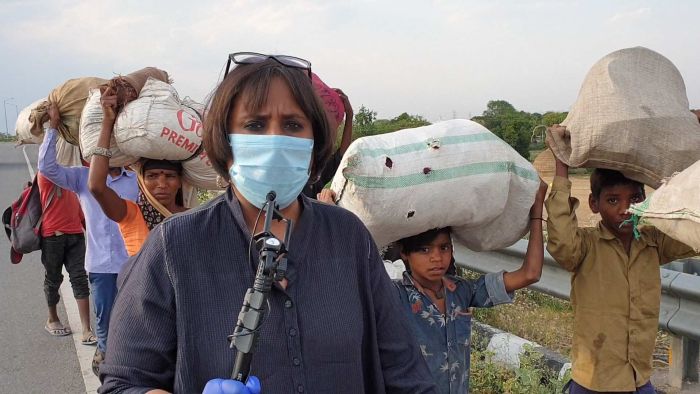On the road south of Kota, scores of men and women line the roadside, children on their hips and their meagre belongings packed into hessian sacks balanced on their heads.
Running along beside them, grasping a microphone and trying to keep pace, is one of the country’s most famous TV journalists, Barkha Dutt.
Rahul and his family have already walked 700km over 15 days and will continue like this for another 200km to get home to their village.
His job on a cumin plantation in Rajasthan came to an abrupt end on March 25 when Indian Prime Minister Narendra Modi shut down the country with just four hours’ notice.

Enacted swiftly to stop the spread of a deadly virus, the world’s largest lockdown suddenly left Rahul unemployed, homeless and broke, and afraid his family would starve to death.
In a country of almost 1.4 billion people, where over 20 per cent live below the poverty line, for many like Rahul the lockdown comes with its own life-threatening consequences.
‘That’s for my class of people’
Barkha Dutt catches up with Rahul, who’s pacing down the road with his son on his shoulders.
After the state suspended public transport to stop people moving around, Rahul and millions of other migrant workers were forced to return to their villages on foot.

As if life wasn’t surreal enough, now he’s on a highway being interviewed by the woman often called the Oprah of India.
“You must be aware of the coronavirus, due to which moving around is not safe now?” Barkha asks.
“Yes, I’ve heard of corona,” Rahul says, “but the rich people, what do they do? They push us away.”
Since quitting her national prime-time TV talk show, Barkha has been running her own digital media company.
Loading
She has been on the road with her crew for more than 60 days during the COVID-19 pandemic, posting reports from the frontline of the crisis to her millions of YouTube and Twitter followers.
On March 31, the Modi Government insisted there were no more migrant workers on the road. Through April and into May, Barkha would put a lie to that claim, revealing some were still on the long march home more than 50 days after the shutdown was imposed.
“When the Government says ‘stay home’ to Indians and says ‘you’re safe’, that’s for people like me, my class of people,” she says.
Barkha initially accepted the need for a lockdown to stop the spread of the coronavirus. But her face-to-face interactions with those displaced by

